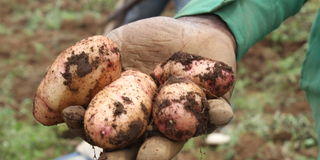The love-hate relationship between Molo residents and potato farming

Farmers in Molo continue to practice potato farming despite the challenges they face.
As you drive off the Nakuru-Eldoret highway making your way into Molo town, you are greeted by a magnificent sight of trees that go as far as the eyes can see.
The weather also begins to change as it instantly becomes chilly.
Once in the small vibrant town, we come across a high number of boda boda riders with huge potato sacks on their motorbikes, a clear indication that the potato business is thriving in the area.
John Kamau, a resident of Molo says he was born into the potato farming business.

John Kamau has 10 acres of potatoes in Molo.
“Currently, I have planted 10 acres of potatoes. We mostly plant the shangi variety as most Kenyans prefer it. We then sell the red Irish potatoes to Ugandans who come to buy it from our farms,” he says.
Kamau adds that a 50-kilogram bag of potatoes goes for between Sh 1,000 and Sh 1,300 during the high season and when there is no supply it can go to up to Sh 2,000.
He notes that accessing certified seeds and the right pesticides for the crops is a major challenge for him.
"Some times we use rabbit urine and tobacco to kill pests in the farm, since the pesticides we buy from the agrovets do not work that well," he laments.
We meet another farmer, Oseko Okiro, who was harvesting his potatoes.

Oseko Okiro harvests potatoes at his farm in Molo.
“Despite this being a virgin land, the size of potatoes we are reaping are very small compared to the normal size we are used to,” he says.
Although Okiro received the government’s subsidized fertilizer, he laments that it was not the best kind for potatoes.
“The government was giving NPK which is best for maize. Potatoes do well with the DAP fertilizer. We hope the government considers this in the next distribution phase,” he adds.

Molo is known for its vibrant potato farming business.
At Keep left centre, the famous chips mwitu is sold here with numerous people flocking the centre to buy this delicious commodity. A serving goes for fifty Kenyan shillings.
On our way out of Molo, we meet Mrs. Eunice who benefits from the potato storage facility at Posta junction.

Eunice is a casual worker at the potato storage in Molo.
“This storage facility was built here in 2015 and we were very happy since majority of us are potato farmers. Whenever they bring seedlings here, we get employed to assist in offloading and sorting the various seedlings,” she says.
Mrs. Eunice however adds that she wishes the government would help install a cooler and electricity in the store, as most of the potatoes get spoilt easily due to the heat that affects them.
Even though the residents may be undergoing various challenges, they still seem to be all in with regards to planting potatoes and investing in the business.
[email protected]
